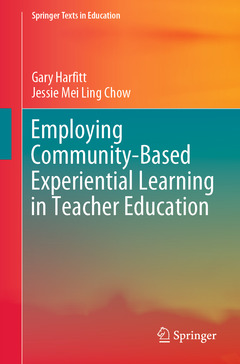Description
Employing Community-Based Experiential Learning in Teacher Education, 1st ed. 2020
Springer Texts in Education Series
Language: English
Subjects for Employing Community-Based Experiential Learning in...:
Publication date: 07-2020
Support: Print on demand
Support: Print on demand
Description
/li>Contents
/li>Biography
/li>Comment
/li>
This book positions itself at the intersection of the interrelationship between three key areas of initial teacher education: constructivist learning theories, teaching practicum, and the promotion of reflective practices. It presents an innovative approach to teacher preparation at undergraduate and postgraduate levels by critically examining the implementation of a mandatory experiential learning block across subject disciplines on undergraduate and postgraduate teacher preparation courses. This book presents multiple examples and case studies of these varied experiential learning projects that will inform academics, teachers and policymakers. Through these rich examples the authors set out to address the theory-practice dilemma in teacher education, where teachers-to-be are often positioned as ?consumers? of educational research in classrooms, read reference books and academic papers on teaching, and observe university and school experts before applying the same acquired theories and practices in their own classes. In the book the authors argue for a shift away from this conventional teacher-learning curriculum that is characterised by the separation of theory and practice, choosing instead to promote pedagogy and methods courses where practice underpins all learning. These pedagogical perspectives include the promotion of a diverse range of learning contexts (including on- and off-campus learning sites) for student teachers to experience during their time on teacher education courses.
Chapter 1: Concepts and Context.- Chapter 2: Transforming Initial Teacher Education through Community-based Experiential Learning: An Overview.- Chapter 3: Getting started: Designing your own Community-based Experiential Learning (CBEL) Initiatives.- Chapter 4: CBEL in Practice: Case Study 1.- Chapter 5: CBEL in Practice: Case Study 2.- Chapter 6: CBEL in Practice: Case Study 3.- Chapter 7: CBEL in Practice: Case Study 4.- Chapter 8: CBEL in Practice: Case Study 5.- Chapter 9: Counter-stories: Lessons learned from Community-based experiential learning projects.- Chapter 10: Designing and facilitating ‘reflection-on-action’ and ‘reflection-in-action’ in Community-based EL.- Chapter 11: Some final thoughts.
Gary Harfitt is the Associate Dean for Teaching and Learning in the Faculty of Education at the University of Hong Kong with specific responsibility for Experiential Learning at UG and PGDE levels. He has won multiple awards for teaching excellence at HKU and is an educator with almost 30 years of experience of teaching in local schools and preparing teachers in Hong Kong. His work with undergraduate and postgraduate teachers at the university has included teaching multiple Experiential Learning projects and he draws on this experience through the proposed book.
Jessie Chow, as a registered educational psychologist, worked closely with in-service teachers and families with different special educational needs for a decade before joining the University of Hong Kong to support experiential learning programmes. She has been instrumental setting up EL projects across undergraduate and postgraduate levels that explore key aspects of the field’s development in Asia and has also published an online guidebook for EL facilitators to promote EL to a wider audience.
Solves open problems in the analysis and structure of initial teacher education programmes
Clarifies the differences between Experiential Learning and more traditional forms of field experience
Equips readers to integrate their own Experiential Learning projects into teacher preparation courses
© 2024 LAVOISIER S.A.S.




